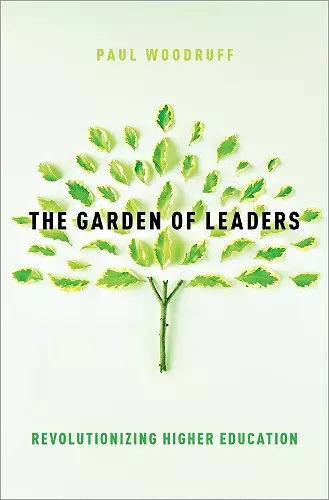The Garden of Leaders
Revolutionizing Higher Education
Format:Hardback
Publisher:Oxford University Press Inc
Published:21st Feb '19
Currently unavailable, and unfortunately no date known when it will be back

The Garden of Leaders explores two related questions: What is leadership? And what sort of education could prepare young people to be leaders? Paul Woodruff argues that higher education--particularly but not exclusively in the liberal arts--should set its main focus on cultivating leadership in students. Woodruff advances a new view of liberal arts education that places leadership at the root of everything it does, so that students will be prepared to lead in their lives and careers--and not necessarily in management roles. Woodruff views the contemporary university as sorely lacking an emphasis on leadership, and presents three core sets of recommendations for how they can and should foster it. First, Woodruff posits co-curricular groups, activities, and projects as essential activities for students to gain confidence and leadership skills. Administrations should encourage students to engage in activities outside the classroom, convert coached sports teams into student-led clubs as far as possible, and discourage social organizations that are segregated by race or sex. Second, Woodruff advocates for a different curriculum for all undergraduates, no matter their major-arguing that they need to be taught leadership in the forms of key skills including communication (including good writing, listening, and speaking), as well as exposure to key material in history literature, social science, and ethics. Students should be asked to consider the hardest ethical dilemmas that leaders face, toggling between Machiavelli and great ethical thinkers such as Confucius and Socrates. Third, Woodruff calls for the teaching methods used by instructors to re-orient themselves around the question of leadership, particularly by emphasizing teamwork. Professors should respect their students' independence, avoid tyrannical teaching, and remember that all teachers teach ethics simply by the examples they set in dealing with students. Whether in engineering, music, or classics, The Garden of Leaders advances leadership as a core value that should be at the heart of the educational enterprise-contending that while a college campus can be many things, it should at the very least be a ground upon which new leaders can grow.
Woodruff has written an outstanding book designed to provide administrators and faculty with a refreshing perspective-that leadership should be the mission of colleges and universities. * M.J. Safferstone, CHOICE *
In today's world, the question of what exactly constitutes leadership is perhaps more difficult to answer than ever before. And equally difficult to answer is how leadership should be taught to future generations. Drawing on examples from across the ages, Paul Woodruff offers an elegant and passionate plea to educators to give students the right experiences they need to become well-rounded renaissance leaders. * Bjorn Billhardt, CEO of Abilitie (offering leadership exercises to corporations) *
Paul Woodruff's insights let great works from classical antiquity speak out loudly and clearly about how our society can develop the leadership we so badly need. * W.R. Connor, Director, National Humanities Center, 1989-2003; President, The Teagle Foundation, 2003-2009 *
Woodruff tackles a problem that impacts us all; where can we find leaders that we can trust and who express qualities such as courage, justice, wisdom, and an ability to bring people together? We assume that our universities want to develop these qualities of character but many simply don't know how. This book outlines some revolutionary actions that professors, administrators, students, and parents can take to grow the kind of leadership that benefits us all. It's the best book on this subject that I've ever read. * David Niño, Gordon-MIT Engineering Leadership Program, MIT *
As always, Woodruff writes clearly and cogently about complex matters by drawing from his remarkably broad and varied background as soldier, philosopher, classicist, and university leader. This is not a how-to book. It is instead a serious meditation by a serious thinker who plumbs literature and life for their lessons in good- and bad- leadership. It is also an overdue call to professors to rethink the way they teach by recognizing that their primary duty is to help their students learn how to confront decisions intelligently and ethically. We have an urgent need for moral leadership in this country today, and reading Paul Woodruff's book is the best way I know to start working on the problem. * Hunter Rawlings, (Former President, University of Iowa and Cornell University) *
ISBN: 9780190883645
Dimensions: 145mm x 211mm x 15mm
Weight: 408g
272 pages